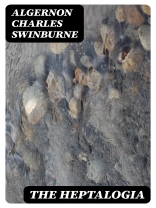Algernon Charles Swinburne’s ‘The Heptalogia’ stands as a complex tapestry of poetic inquiry, intertwining themes of life, death, love, and the divine through captivating verse that challenges Victorian constraints. Written in the distinctively lush and musical style characterizing Swinburne’s oeuvre, the work reflects the composer’s mastery of rhythm and meter, showcasing a brilliant interplay of imagery and philosophical contemplation. Set against the backdrop of the late 19th century, a period rich with scientific exploration and romanticism, ‘The Heptalogia’ invites readers into a profound dialogue about the human condition, transgressing literary and existential boundaries. Swinburne, born into a family steeped in aristocratic lineage, was profoundly influenced by his exposure to classical literature, as well as his travels and studies in France and Italy. His tumultuous life experiences, including a tumult of personal passions and beliefs, are echoed in the emotional intensity of ‘The Heptalogia, ‘ where he grappled with issues of religious doubt, eroticism, and automated identity. This deep exploration into human desires and societal constraints ultimately translates into evocative poetry. Readers seeking a rich exploration of emotional and existential themes will find ‘The Heptalogia’ not only a cornerstone of Swinburne’s poetic achievements but also a compelling read that resonates with contemporary concerns. This collection beckons those curious about the interplay between creativity and constraint, offering an exquisite journey through the intricacies of the mind and heart.
关于作者
Algernon Charles Swinburne (1837–1909) was an English poet, playwright, novelist, and critic who is best known for his lyrical poetry and verse dramas. Born into a wealthy Northumbrian family, Swinburne was educated at Eton and Balliol College, Oxford, though he did not complete his degree. He became associated with the Pre-Raphaelite Brotherhood and was closely linked to figures such as Dante Gabriel Rossetti and William Morris. Swinburne’s poetry is characterized by its emotional intensity, intricate rhythms, and exploration of taboo subjects. Notoriously, he delved into themes of eroticism, sadomasochism, and paganism, intertwined with his mastery of meter and rhythmic complexity.
His collection ‘The Heptalogia’ (1880), albeit lesser-known, demonstrates his prowess in parody and satire, engaging with the works of other contemporary poets. Swinburne’s major works often provoked controversy due to their content but were also praised for their technical brilliance and innovative use of meter and rhyme. His volumes such as ‘Poems and Ballads’ (1866) and ‘Atalanta in Calydon’ (1865) were influential, marking him as a significant figure in Victorian literature. Despite the declining popularity after his death, Swinburne’s work saw a revival in critical interest in the late twentieth century and continues to be studied for its rich use of language and boundary-pushing ideas.












